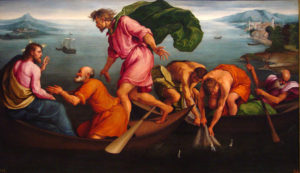Thoughts on Sunday’s Lessons for May 5, 2019
First Reading: Acts 9:1-6, (7-20)
How do we recognize God in our lives? How do we respond when God calls? Consider Saul in Sunday’s first reading.

The Miraculous Draught of Fishes (1545); oil painting by Jacopo Bassano (1510-1592). National Gallery of Art, Washington, D.C. (Click image to enlarge.)
Early Christians had every reason to fear Saul: A frightening figure, a Pharisee angry with the unorthodox new Messianic movement, Saul persecuted the Christians with all his strength. But when Jesus confronted Saul in a blinding vision on the road to Damascus (a narrative much more detailed than anything Paul had written about his own conversion in his letters many years before the Evangelist Luke wrote the Acts of the Apostles), everything changed. Acts reports Saul hearing that by persecuting those who follow Jesus, Saul was persecuting Jesus. Saul’s hatred for Christ and Christians melts away with his restored vision. Saul becomes Paul, who will go on to take Christianity to the world with all the zeal that he had previously turned to persecuting Christians.
Psalm: Psalm 30
Perhaps surprisingly (or perhaps not) for a genre that includes so many calls for God’s help in Psalms of petition, the 150 Psalms include only a relative few hymns of thanksgiving. Psalm 30, according to tradition, specifically offers thanks to God for the Psalmist’s recovery from a serious illness. The Psalm seems consonant with the journeys in today’s readings of Paul, who changed from hate for Christians to life in Christ, and Peter, who went bravely out to proclaim Jesus after having denied him three times. The Psalmist, in turn, sings out in faith that sadness and anger are short-lived, but the joy of God’s favor lives forever. “Weeping may spend the night, but joy comes in the morning.”
Second Reading: Revelation 5:11-14
In last week’s reading from Revelation, we heard its prophecy that Christ would be “ruler of the kings of the earth,” presumably supplanting the emperors of Rome and beyond. This Sunday, a few chapters further into the book, we enter a scene of triumphant heavenly worship in which all creation participates. All the angels and elders of heaven, all the creatures of heaven and earth, humans and animals from land and sky and sea join in worship and song: Together they sing a majestic hymn, filled with symbolic language, that reveals an unexpected surprise: Jesus’s kingship is not that of a roaring lion or any earthly ruler, but a lamb, a vulnerable creature, symbol of the Passover; a victim who was slaughtered but is now raised and glorified for all.
Gospel: John 21:1-19
Seven of the disciples are back home in Galilee, and perhaps seeking a break from the emotions of Jesus’ crucifixion, resurrection, and mysterious appearances, they get in their boat for a night-time fishing trip. They haven’t had any luck, but suddenly a stranger appears on the shore and suggests that they try casting their net on the other side of the boat, and they haul in a bulging net-load. Suddenly John recognizes Jesus, prompting Peter to jump in the water and run for shore. The delighted crew all join Jesus, who cooks them fish and bread on a charcoal fire and feeds them. Then Jesus asks Peter three times, “Do you love me?” Peter, apparently forgetting how recently he had denied Jesus three times, is offended that Jesus has to ask this repeatedly. But this is in the past now, as Jesus directs Peter, “Feed my lambs. … Feed my sheep.” Then Jesus predicts Peter’s eventual martyrdom, and calls him, as he had done at the beginning of his ministry: “Follow me.”
